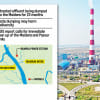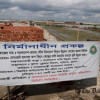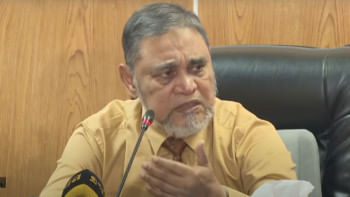Rampal Power Plant: Protest in India too
Social and civil society activists in India yesterday wrote an “open letter” to Prime Minister Narendra Modi, appealing to him to withdraw support to the proposed Rampal thermal power plant that might cause "irreparable damage" to the Sundarbans in Bangladesh.
Addressing a press conference at the press club in New Delhi, they expressed solidarity with those in Dhaka campaigning against the coal-based plant to be built 14 kilometres off the world's largest mangrove forest, an eco-sensitive zone.
Madhuresh Kumar of Narmada Bachao Andolan's National Alliance of Peoples Movement said activists in Bangladesh, who are opposing the project, are getting “life threats.”
“We are not against development but it should be shifted from the proposed site,” said Ashok Chowdhury, a member of All India Union of Forest Working People.
Social activists from Bangladesh wanted to go to India and “we wanted to organise a big protest against the proposed power plant”, he said, but getting visa was a problem.
Strong anti-India sentiment was seen among the participants of an anti-Rampal procession held in March in Bangladesh, Madhuresh said.
“Fundamentalist groups can exploit that.”
The public sector companies in India and Bangladesh in the case of the Rampal plant have been “behaving in the manner in which the private sector companies do,” Madhuresh said.
Asked about the BNP's stance on the issue, he said, “They are not openly supporting us or the project. But ultimately, they will use the issue to their political advantage.”
The “open letter” to Modi written by Indian social and civil rights activists said the Rampal project is opposed by people in Bangladesh and India for its social and environmental negative impacts, particularly the irreversible damage to the Sundarbans and the fragile ecosystem around it.
Forty percent of the Sundarbans is in India and any damage to that will have devastating impacts on thousands of fishermen and forest dwellers depending on it, apart from harming the natural protection from calamities like tsunami and cyclones, they said in the letter, a copy of which was released at the press conference.
“We urge you [PM Modi] to look at the colossal damage this project will cause to people and environment in India and Bangladesh and withdraw India's support to the project,” reads the letter.
The letter condemns death threats to Prof Anu Muhammad and requested Modi to urge the Bangladesh government “to ensure the safety of political activists there.”
The letter was signed among others by Ashok Chowdhury and Roma Malik, All India Union of Forest Working People; Madhuresh Kumar, National Alliance of People's Movements of Narmada Bachao Andolan; Priya Pillai of Greenpeace India; Soumya Dutta of Bharat Jan Vigyan Jatha; Afsar Jafri, Focus on the Global South; Ayesha DSouza, Centre for Financial Accountability; Bharat Patel, Machimar Adhikar Sangharsh Sangathan, Environment Support Group Trust, Bangalore; Gautam Bandyopadhyay, Nadi Ghati Morcha; Gururaja Budhya, Urban Research Centre, Bangalore, India; Himanshu Damle, Public Finance Public Accountability Collective; Himanshu Thakkar, South Asia Network on Dams, Rivers & People, Delhi Indian Social Action Forum, Indigenous Perspectives; Jiten Yumnam, Secretary, Centre for Research and Advocacy, Manipur; Manshi Asher, Himdhara Collective, Himachal Pradesh, North East Peoples Alliance; PT George, Intercultural Resources; Ravi Rebbapragada, Executive Director, Samata India; Samir Mehta, International Rivers South Asia; Shweta Tripatji, Society for Rural Urban and Tribal Initiative, The Research Collective; Umesh Babu, Delhi Forum; Vaishali Patil, Forum Against Disastrous Project in Konkan, and Vijay Pratap, South Asian Dialogues on Ecological Democracy.

 For all latest news, follow The Daily Star's Google News channel.
For all latest news, follow The Daily Star's Google News channel. 







Comments